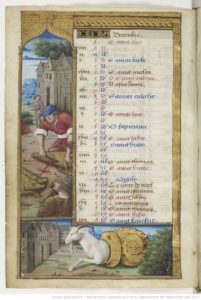According to the 5th-century Acts of the Martyrs, a disappointed suitor denounced Lucy as a Christian, and she was executed in Syracuse, Sicily, in A.D. 304, during the Diocletian Persecution. She was born to noble parents, but her father died when she was five years ago, leaving her and her mother Eutychia without a guardian. Lucy consecrated her virginity to God, but her mother, unaware of this, arranged Lucy’s marriage to a young man of a wealthy pagan family. After seeing a vision of Saint Agatha which cured her mother of a disorder, Lucy entreated her mother to allow her to distribute a great part of her riches to the poor. Eutychia objected, saying the wealth would make a good bequest, but Lucy countered, “… whatever you give away at death for the Lord’s sake you give because you cannot take it with you. Give now to the true Savior, while you are healthy, whatever you intended to give away at your death.” Her betrothed, hearing of Lucy’s plan, and angered at the loss of a dowry, denounced Lucy to the Roman authorities.

“December”, kalendar page from Les Petites Heures d’Anne de Bretagne (The Little Hours of Queen Anne of Bretagne), by the Maître des Triomphes de Pétrarque. From Bibliothèque nationale de France, Paris (France).
There are also varying stories about Lucy’s eyes. In one version, the foretold the end of Diocletian’s reign (and that of his co-emperor Maximian), so the Governor of Syracuse ordered that she be blinded. In another, she took out her own eyes to discourage a suitor who admired them. In either case, her eyes were miraculously restored when her body was being prepared for burial in the family mausoleum.
Lucy’s feast day is December 13th. Before the Gregorian calendar reforms, her feast day coincided with the winter solstice. Given that Lucy’s name means “light” in Latin, her feast day was considered to be particularly portentious. John Donne’s poem, “A Nocturnal Upon St. Lucy’s Day”, uses this “midnight of the year” to contemplate the loss of love.
The winter ember days are the Wednesday, Friday, and Saturday closest to her feast day (or alternatively, closest to the third Sunday in Advent).


